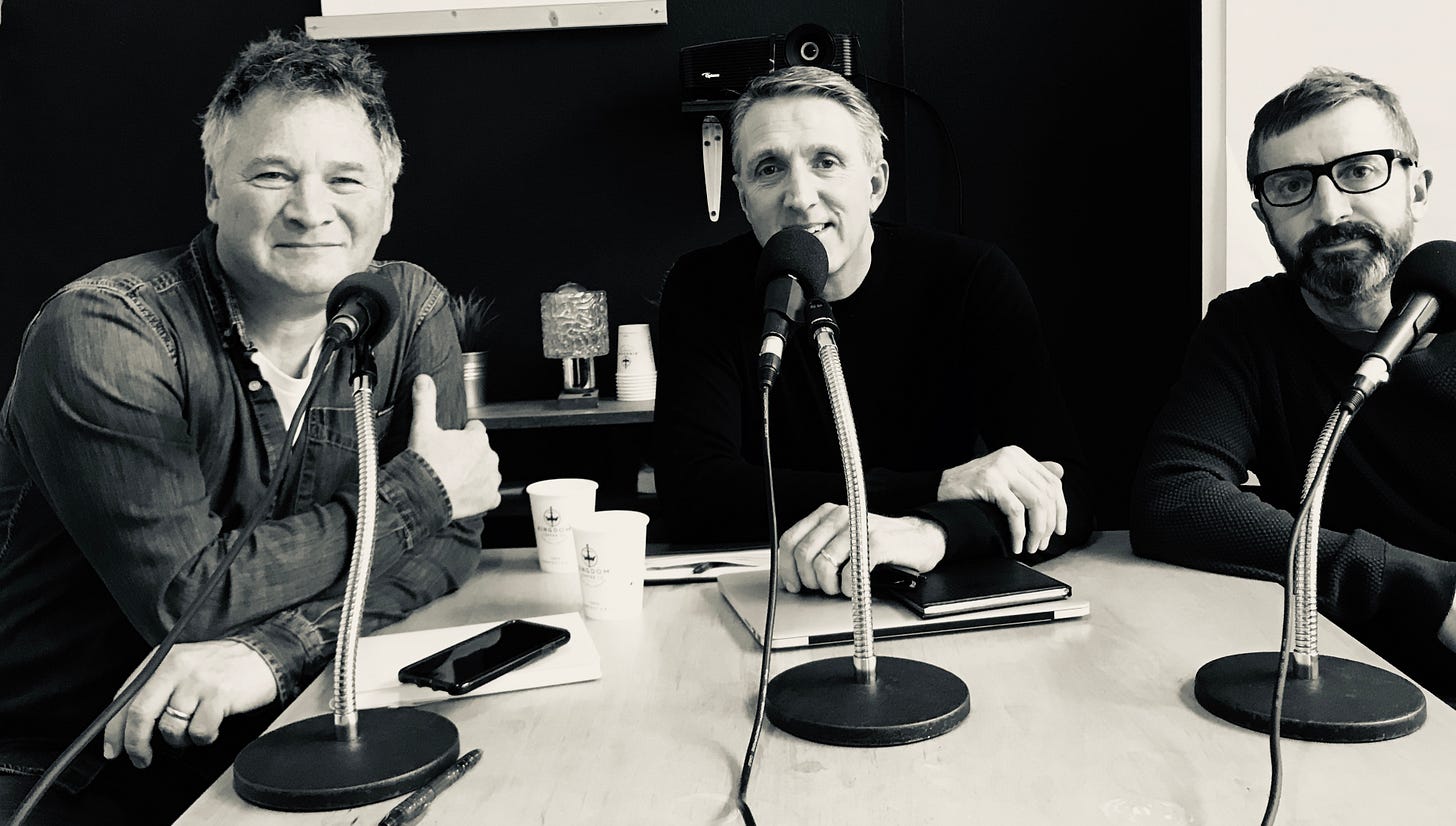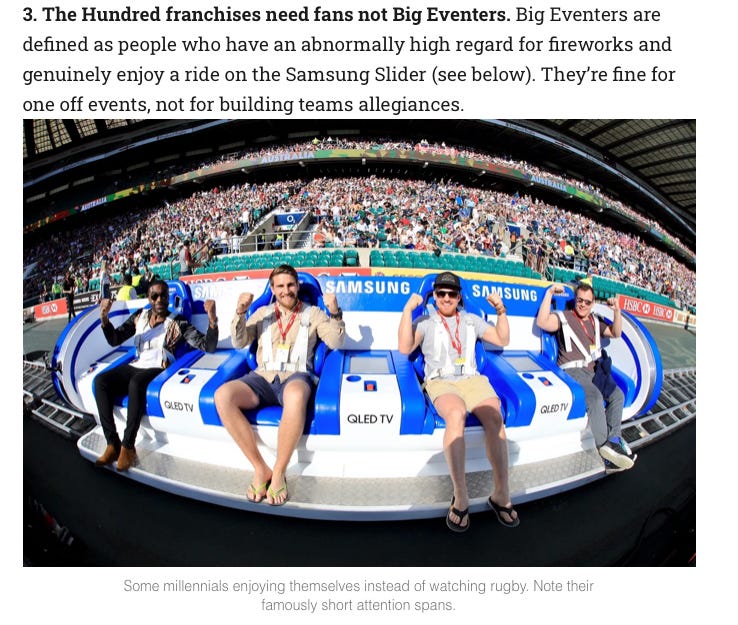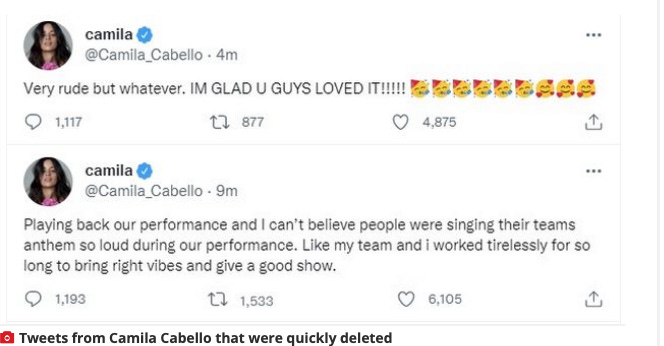UP250; McCormack to the Metaverse; Missing the crypto bubble; What's German for Schadenfreude; Hawksbee's maxim; Music at sports events; Poulter as moral arbiter; LIV's terrible team names
Overthinking the sports business, for money
This newsletter is sponsored by Turnstile.
Turnstile uses real market rates to quantify the value every single sponsorship right within a deal, looking beyond the traditional media metrics to calculate the value of the Exposure, Intellectual Property and Direct Benefits.
This enables Turnstile to deliver a recommended transaction price that’s comprehensive, accurate and defensible.
If you value your sponsorships, value them properly.
Get in touch at turnstilegroup.com
UP250 McCormack to the Metaverse
Time flies when you’re making (250) podcasts.
Big thank you to our listeners and all our guests, from Aarti Dabas to Zarah al Kudcy, and the 285 people in between - click the link above to see the entire guest roll call.
The idea for Unofficial Partner is to tell the story of the sports business, from McCormack to the Metaverse.
And we’ve only just scratched the surface.
Keep up or fuck off

From UP episode 1 with Paul Hawksbee (Bafta winning script writer for Harry Hill, producer of Fantasy Football with Baddiel and Skinner, Talksport host and founder of 90 Minutes, the original funny football magazine).
We were talking about levels. As in, how to gauge where to pitch material for the target audience.
The best things in any sphere feel like clubs, or gangs. There’s a shared code, a sense of belonging.
The creators know their audience, often because they’re one of them.
Then the question arises, how do we grow?
And the creator starts to write for an imagined audience of people they don’t know. They start writing for ghosts; marketing personas.
They start losing faith in their own jokes because they’re not sure the new people will get them.
This is a technical issue too: How much information do you need to give the audience for them to understand it, and whose responsibility is it to do this work, the creator or the audience?
How far do you have to travel to reach new people before you irritate the old gang, the ones who pay your bills and don’t want their thing ruined by dumbing it down? When does inclusivity become an excuse for ignorance?
At what point do you have to say, keep up or fuck off.
It’s not a big jump to apply these question to sports marketing’s never ending GenZ/Big Eventer/Grow the Game challenge.
Building out an audience requires a real understanding of the value that lies within the thing you’re growing.
Build: When out of ideas, add noise (and music)
Wieden+Kennedy’s marketing of LIV Golf is wrestling with the new audience question in real time.
W+K were referenced by now-ex front man Sean Bratches (UP243) as the agency he recruited to the LIV project, having previously commissioned them in his previous roles at F1 and ESPN.
W+K’s work with Nike means their sports marketing credentials are impeccable.
But I can’t help feeling they’re having an off day.
Part of their brief is the creation of the team brands.
Mentioned previously, teams are far more central to the LIV/PGL business model than commonly realised.
Which is why it’s just plain weird how crap the initial presentation of the teams is.
Team fandom is incredibly hard to cultivate from scratch and sustain beyond the excitement of a launch.
Doesn’t help if the execution is done by the intern.
Sergio’s Fireballs ffs.
See also; a previous UP letter.
Build: The Super Bowl half time show is an outlier not a proof of concept
(Made) UP research suggests: music at sports events is welcomed by fans 14% of the time.
An odd choice for LIV’s Saturday night knees up.

See also: The UEFA Champions League final and the plight of Camila Cabello.
Golfer as moral arbiter
Sport doesn’t build character, it reveals it.
See also, Ian Poulter’s Ferrari collection.
Schopenhauer’s Schadenfreude
‘The misfortune of others tastes like honey’ is how the Japanese put it.
Nicked from Jawad Mian’s bit on the recent crypto crash.
With almost $1 trillion in value wiped off digital assets, all those who missed out on the opportunity are rejoicing. This reflects how nauseating it has been for many to watch crypto bros succeed. A $1,000 investment in bitcoin in 2010 is worth $350 million today (down from $625 million last year).
Schadenfreude is a coping mechanism, clinging on other people’s disappointments in order to feel better about their own. The philosopher Arthur Schopenhauer called it “an infallible sign of a thoroughly bad heart and profound moral worthlessness.”
It’s unclear whether Schopenhauer ever sold sponsorship rights for a sports federation.
Crypto, web3, NFTs and other forms of digital asset have created a dividing line across the sports industry, between those who’ve cashed in and those who haven’t, or haven’t yet.
‘We’re talking telephone numbers,’ one rights seller told me this week.
The moolah comes with obvious caveats: can you take the cash and keep the moral high ground, without turning your fanbase in to a liquidity pool to be set upon by speculators, under the guise of fan engagement.
This goes beyond comms and in to risk mitigation around sponsors defaulting.
The lesson of Covid has been that the much vaunted ‘trust between valued partners’ goes flying out of the window when minimum guarantees remain unpaid and licensees go in hard for clawbacks.
One route is to wait for the financial sector to regulate the crypto category.
That offers a safer route for those at the worried/risk averse end of the sports market place, particularly those with a broader governing body remit.
But that could take years, leaving cash strapped feds to watch forlornly as the crypto bubble dissipates.
And never forget, the incentives to take the bro-cash are corporate but also personal.
Chief Commercial Officers at sports rights holders come and go like the 207 bus down the Uxbridge Road.
They (the commercial teams, not the buses) are judged on how much money comes in the door this year, not the long term reputation of the sport’s brand.
Someone has to think long term.
But who?
The CEO? The board? The new private equity owners…?
Crypto’s not going away just because many people have lost money on it in the last couple of weeks. Blockchain may yet end up changing the world, like internet’s 1 and 2 did.
So, what’s sport’s relationship with it?
It’s time to move the conversation beyond short term cash.
Jawad Mian: This is not a time to gloat. Rather, it’s critical to consider the long-term case for digital assets once more. What does a world in which bitcoin succeeds look like?
Which gets us to this:
We’re nearly oversubscribed already, and we haven’t released details on guests, date or venue.
So, if you’re interested, get your name down here:
A big thank you to our mate Alex Cowell and his team at Sponsorworks: Event & Guest Management Software for Brands & Rights Holders.
Can anyone work the printer?
Portas’ annual survey of sports CEOs is always a revealing glimpse in to the C suite. This finding jumped out:
There is an innovation deficit in sports organisations. Only 4% of CEOs strongly believe their organisations are ‘tech-savvy and up-to-date with the latest trends & innovations’
More here: Challenge the status quo - Portas CEO Survey 2022 UK | Portas (portasconsulting.com)
Business Development Manager: Fan Connection - Twenty First Group
The Blurb: Twenty First Group are a global sports intelligence agency, striving to get our clients ahead and keep them ahead. We combine strategy, data science, engineering, and design to help some of the biggest names in sport find an edge over their competition and increase their chances of success.
Now, the commercial team is looking for either a NYC or London-based BD Manager to sell best-in-class solutions to rights holders, brands, broadcasters, betting operators, D2C platforms, and other relevant partners in the world of sports audience development and commercialisation.
The link: Find out more here
If you’re looking for talent and want to use this spot, get in touch with Sean@UnofficialPartner.co.uk











